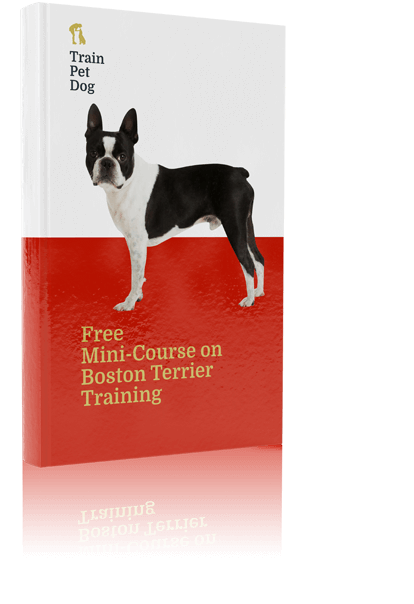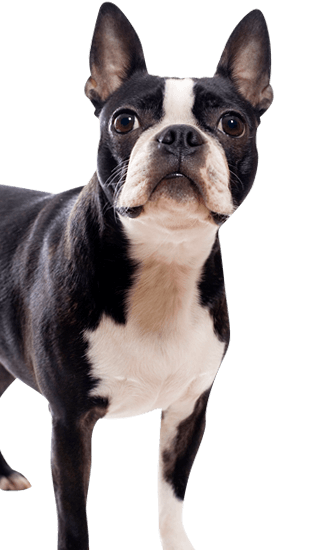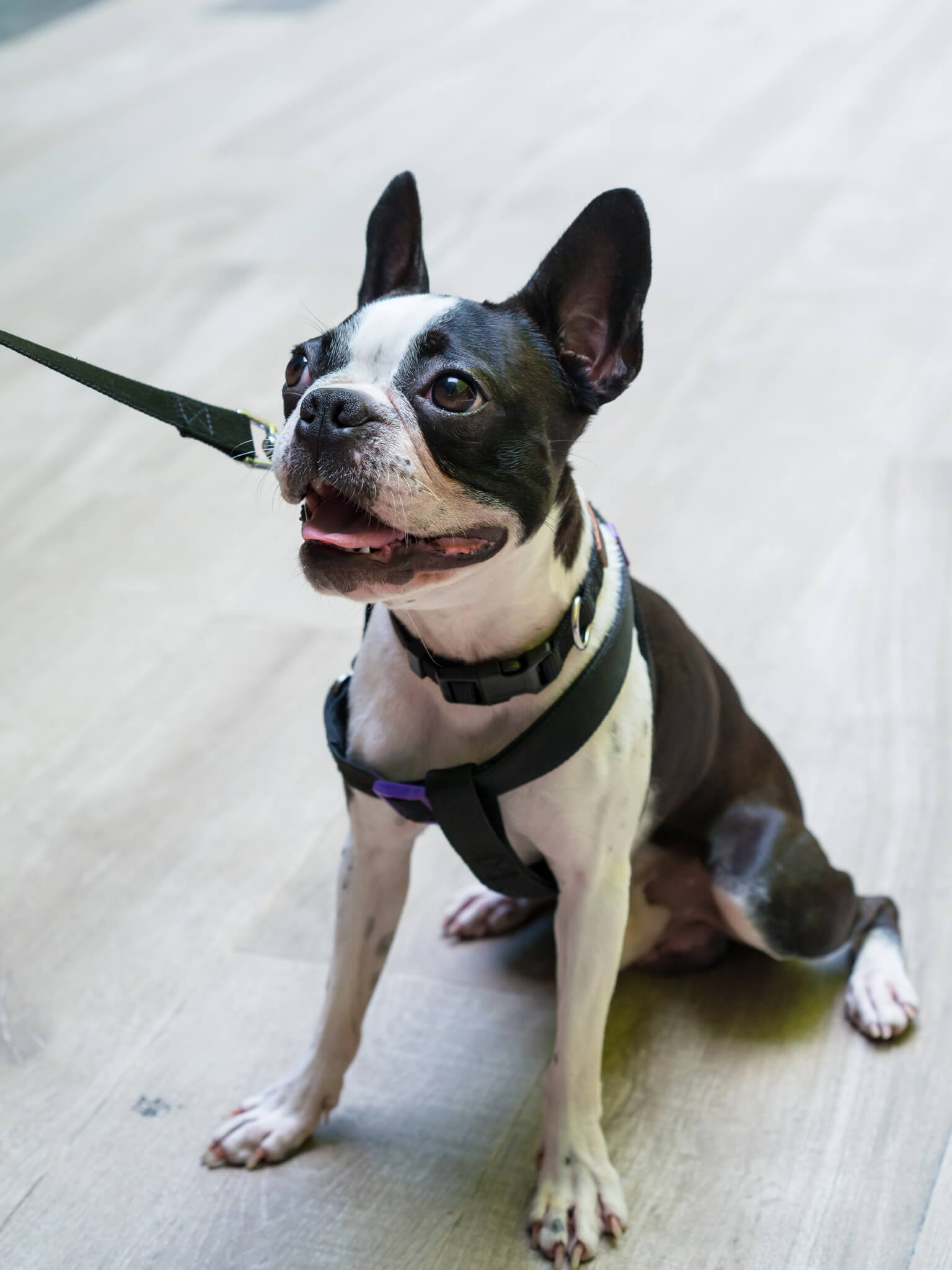Privacy Policy: Your email address is 100% safe.
We don't spam and hate it as much as you do :-) You can also unsubscribe from our mailing list at any time.

Sign Up
Boston Terrier: Training, Breed Temperament, Exercise Needs & Health (Boston Bull)

Country of Origin, History of Boston Terriers
The Boston Terrier originates from the United States of America. The breed has been around since the year 1870, when a man named Robert C. Hooper bought a dog named ‘Hooper’s Judge’. Hooper’s Judge was a cross between an English Bulldog and an English White Terrier.
Over time the breed was bred down in size and in 1893 they gained recognition with the American Kennel Club.
In 1889, about thirty people from the Boston area organized the American Bull Terrier Club. Dogs known as "Round Heads" or "Bull Terriers" were bred and exhibited by these people. Bull Terrier breeders objected that these crosses were not Terriers and Bulldog breeders objected because they were not Bulldogs. In 1891 the name was changed to the Boston Terrier Club of America, (BTCA) and a standard was written. In 1893 the breed was accepted by the American Kennel Club.
By 1915 the breed was stabilized and had become the most popular in the country. They were number one in registrations in 1919, 1920 and 1930. The Breed remained in the Top Ten until 1960, but have slipped steadily since that time.
This Breed has become refined and standardized, has this intelligent and spunky little dog is a fitting representative of the spirit of independence from Boston Commons.
Boston Terrier Tools
Breed Selector Tool - is the Boston Terrier the right breed for you?
Is the Boston Terrier the right breed for you and your family?
Find out by using our Free Dog Breed Selector Tool
Check Your Boston Terrier's Learning Style
Are you aware dogs also have a learning style that can greatly affect their ability to housetrain as well as be trained correctly. Evaluate your Boston Terrier's learning style and personality using our free Learning Style tool so that you are better able to provide him with the proper Boston Terrier training methods.
Is your Boston Terrier dominating over you?
Does your Boston Terrier bark unnecessarily? Does your Boston Terrier come to you when you call? Download a FREE Report on Dog Dominance for you and your Boston Terrier and learn how to control your dog.
Do you make these mistakes with your Boston Terrier?
Are you inadvertently snow-balling bad behavior in your Boston Terrier? Evaluate your Dog Training Style from our Free Tool and learn how best to deal with your dog.
Boston Terrier Calorie Calculator
Do you know how many calories your Boston Terrier needs every day and how many cups of food you should be giving it every day? Click here to use our Boston Terrier Calorie Calculator.

A General Appearance of the Dog
The Boston Terrier has a typical "tuxedo" appearance. They have a squarish head and a short muzzle with no wrinkles. They have a broad chest and a short tail.
Coat Type
They have a short, shiny, smooth coat.
Coat Color
Typically they have white marks on black, brindle, seal or very dark brown coat. Due to the Boston Terrier's markings resembling formal wear, the breed is jokingly called "the American Gentleman."
Height: 15-17 inches
Weight: 12-25 pounds



Free Boston Terrier Training Secrets
Free Course on Boston Terrier Training & Obedience
Stop All Bad Behavior, Excessive Barking and Biting
Boston Terrier Personality Traits

Temperament of the Dog
Although the dog was originally bred for fighting, it has been since bred down to more of a companion dog. These days the breed is gentle, well-mannered and alert, and they also tend to have a few of the spunky Terrier characteristics.
One advantage of the breed is that they are fairly quiet animals and they do not bark unless it is necessary. They love being around people and they are quite a cuddly breed. However, there are some which prefer to be independent.
The breed also tends to have a sense of humor and they can be fairly enthusiastic and occasionally Rambunctious. They can make good watchdogs although generally they are really good with strangers.
As well as being naturally quiet dogs, the female breeds have been reported to not bark at all. This means if you are looking for a watchdog, a male would be your best choice.Although they are generally a gentle breed, they can be protective of their families and extremely loyal too.Overall this breed is one of the best family pets to own.
Better suited to an indoor or outdoor lifestyle?
The Dog generally should be kept indoors. All small breeds are better off indoors, especially if they only have a short coat which will not keep them warm enough in the colder months.
Are they suited to homes with kids?
As the dog loves to be around people, it would ideally suit a home where there is somebody constantly with it. A home with children is ideal as they will give the dog plenty of attention and the breed thrives in a family household. As the breed is so small and they do not need a great deal of exercise, they can be kept in an apartment. This breed does not cost much to keep so it is an ideal breed for those who are on a low income.
Training
Due to their intelligent nature, the breed is fairly easy to train. They are willing to please and the only problems people generally tend to have with the breed is housebreaking. Whilst the dog is intelligent it can often take a while for it to learn various things and housebreaking is one of them.
It is always easier to start training the dog as early as possible. If shown from an early age what is expected of them, they will learn a lot quicker and you will not have as many problems when the dog grows up.
This breed tends to thrive on routine and they need a training schedule which is structured and consistent. Ensure that the puppy is not allowed to chew much when they are first brought home. Whilst it may seem cute at first, the puppy’s teeth will grow and it will carry the habit through until they are fully grown where it starts to become a problem! So, be consistent and stick to a routine. That way your dog will know exactly what is expected of them and they will be a lot easier to train.


Free Boston Terrier Training Secrets
Free Course on Boston Terrier Training & Obedience
Stop All Bad Behavior, Excessive Barking and Biting
Boston Terrier Activity Level
How active is the breed?
The Boston Terrier is not overly active and so usually you can get away with having only a fenced yard for them to play in. They can easily be kept in an apartment without any worries about whether or not they will chew the place to bits whilst you are gone.
Generally tiring them out with a few dog toys seems to do the trick and one walk a day is often sufficient enough for them.
Exercise Needs
As a puppy the breed will not need much exercise at all. Just a few sessions of playing with them with a dog toy will be enough for them as they tend to get tired out fairly easily. You should never play with your puppy straight after they have eaten as this could cause serious health problems with the dog. Adult dogs do not need much exercise at all, and usually just running around in a fenced yard, or taking the dog on one walk a day should be enough. Remember that this breed has small legs so when you do go for a walk, it should only really be a short one as you do not want to tire the dog out too much.
How to take care of a Boston Terrier Puppy?
When you first purchase your dog puppy it is essential that you feed them regular, small meals throughout the day. It is always better to feed a good quality food and try and keep the diet consistent. If you change it too much the puppy will develop an upset stomach.
All puppies need rest and quiet time in order to allow them to properly settle and grow. It is also important to socialize your puppy from an early age as some male dogs have a tendency to fight.
The breeds like all small dogs should not be overfed. It is always better to feed around three small meals a day and the food should be a mixture of dry biscuits and meat.
Grooming
The breed sheds seasonally and usually you only need to brush the dog weekly with a firm bristle brush. As the coat is so short there is no risk of it becoming matted, that is why daily grooming is not always necessary. To keep them completely clean, it is always better to wipe the face daily with a damp cloth and be sure that you clean around the eyes as they are prone to eye infections.It is also important to check the ears frequently too for any signs of infections or irritations.


Free Boston Terrier Training Secrets
Free Course on Boston Terrier Training & Obedience
Stop All Bad Behavior, Excessive Barking and Biting
Health and Care
Genetic Problems
The Dog suffers from problems such as Respiratory problems, eye infections, heatstroke and cataracts. The breed also suffers from snoring and snorting due to its incredibly short muzzle. Another problem also includes gas which is usually caused by the dog's diet. You should find that changing the diet a little will really help to eliminate the problem.
Breeding the Dog and any Cautions
When breeding any dog you need to think about the health of your dog and whether it has any faults at all. There are far too many breeds ending up in rescue home these days and so breeding really does need to be seriously thought about beforehand.
If you are still interested in breeding, then you will need to make sure that you have a nice, safe, warm place where the puppies will be born and where they will not be disturbed. It is possible for a new mother to kill her puppies if she feels they are being threatened.
There are always problems which could arise so it is always best to have a vet on hand. It is a good idea to speak to the vet before you decide to breed anyway as they will be able to tell you if your dog is in good enough health and what you will need to consider before breeding them.
Litter Size: The average litter size is 3-4 puppies.
Life Span: The dog can live from thirteen to fifteen years.
National Breed Clubs
National Breed Club
e.g. The National Club of the Boston Terrier in America is called 'Boston Terrier Club of America'. There is also a Boston Terrier Club of Canada.
Recognition
The Boston Terrier is recognized by: FCI, UKC, CKC, AKC, ANKC, KC(UK), NZKC
Group: Utility, Non-Sporting Group
AKC Popularity Ranking: 21
Also Known As: Boston Bull, Boston Bull Terrier
Train Your Boston Terrier To Listen To You
Get Instant Access to Your Training Now - For Free
Sign up for our Free Boston Terrier Mini Course to have a housebroken, obedient dog that happily comes to you every time you call.
You'll learn new commands to obedience-train your dog as well as how to housebreak your dog in 6 days or less.
You'll also learn how to eliminate bad habits like barking, nipping or biting, jumping, or pulling on the leash.Here's just s small fraction of what else you'll learn in the course:
How to lead and think like a pack dog - the new psychology.
3 dangerous mistakes that most Boston Terrier owners make when they are trying to potty train their dogs.
The 2 main reasons why your dog barks excessively and how to control its excessive barking.
How to obedience train your Boston Terrier to permanently end behavioral problems like Jumping, Aggression, Pulling on Leash.
A surprisingly easy way to teach your dog cool new tricks.
How to improve your dog's lifespan and keep it from getting overly heavy with a healthy and nutritious diet.
Getting Pro help fast - how to get access to our expert trainers when you need them most.
One hidden psychological trigger that all Boston Terriers have... that practically allows you to "analyze" and "control" your dog's every action.
Priority access to the free online seminars conducted by our training experts.
Whereas other dog training related web sites and books offer generic information for dogs in general, ours is the ONLY web site that offers Boston Terrier information specifically, from a renowned panel of experts - because as you probably know, Boston Terriers have their own special training requirements that other dogs don't have.
Our Dog Experts
The Boston Terrier training information you will read here was developed by a panel of renowned dog training experts whose combined wisdom represents nearly 100 years of specialist experience training dogs.
Here are a few of our experts:




